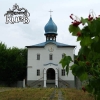Church of John the Baptist
John the Baptist was an itinerant preacher and a major religious figure mentioned in the Canonical gospels and the Qur'an. He is described in the Gospel of Luke as a relative of Jesus who led a movement of baptism at the Jordan River. Some scholars maintain that he was influenced by the semi-ascetic Essenes, who expected an apocalypse and practiced rituals corresponding strongly with baptism, although there is no direct evidence to substantiate this. John is regarded as a prophet in Christianity, Islam, the Bahá'í Faith, and Mandaeism.
Most biblical scholars agree that John baptized Jesus at "Bethany beyond the Jordan", by wading into the water with Jesus from the eastern bank. John the Baptist is also mentioned by Jewish historian Josephus, in Aramaic Matthew,[citation needed] in the Pseudo-Clementine literature, and in the Qur'an. Accounts of John in the New Testament appear compatible with the account in Josephus. There are no other historical accounts of John the Baptist from around the period of his lifetime.
John anticipated a messianic figure who would be greater than himself, and, in the New Testament, Jesus is the one whose coming John foretold. Christians commonly refer to John as the precursor or forerunner of Jesus, since John announces Jesus' coming. John is also identified with the prophet Elijah. Some of Jesus' early followers had previously been followers of John. Some scholars have further speculated that Jesus was himself a disciple of John for some period of time, but this view is disputed.
- St. Vladimir's Chapel
- The Church of Saint Nicholas
- Saint Pantaleon Church
- Sviato Pokrovsky Church
- The Church of Theodosius of the Caves
- St. Vladimir's Cathedral
- Saint Catherine Church
- Theodore of Amasea Church
